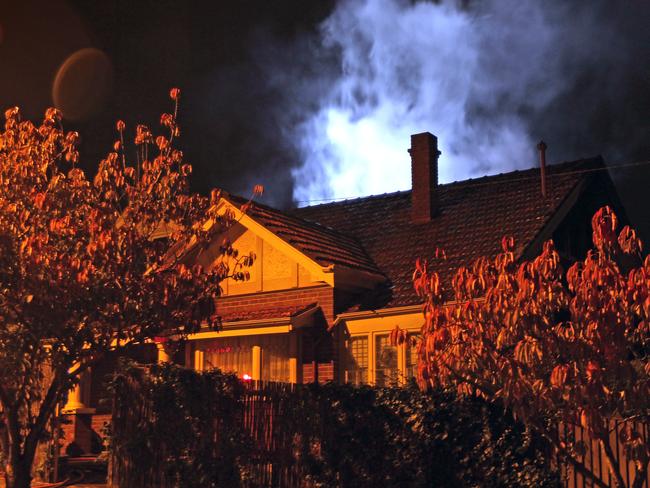Firefighter who battled collapsing Sandy Bay house awarded compensation for PTSD
A firefighter who battled a devastating house fire at Sandy Bay, with the two-storey home collapsing around him, has been awarded compensation after suffering post traumatic stress disorder. DETAILS >>
Police & Courts
Don't miss out on the headlines from Police & Courts. Followed categories will be added to My News.
- ‘A really loud bang’: Drive-by shootings in Launceston shock residents
- Chopper Read’s son Charlie pleads not guilty to taxi driver assault and window smash
A FIREFIGHTER who battled a collapsing house fire at Sandy Bay while a distress alarm malfunctioned inside his helmet has been awarded nearly $100,000 for permanent psychiatric injury.
The career senior firefighter entered a house that was fully ablaze in May 2012 with three other firefighters, all wearing respirators and distress signal units (DSUs) as the two-storey structure collapsed around them.
Roofing tiles exploded from the heat of the fire, falling near the firefighters, with the situation potentially life-threatening.
According to a newly-published Workers Rehabilitation and Compensation Tribunal of Tasmania decision, in normal circumstances, when a DSU activates, an intensely loud alarm goes off in a firefighter’s helmet, with the job ceasing as it means that one of the team is in trouble.
But on this occasion, the DSUs had malfunctioned – and the firefighters pressed on despite the excruciating noise.
“As a result of a malfunction, the DSUs on all four firefighters went into full alarm. The worker tried to deactivate his own DSU and the others in his crew. He could not do it,” Chief Commissioner Alison Clues said.
“He contacted the senior station officer who directed him and the others in his crew to keep fighting the fire despite the malfunctioning of the DSUs. The worker stayed inside the structure with all four DSU alarms sounding.”
Ms Clues said the worker couldn’t concentrate, thought the floor would collapse, and panicked for the safety of himself and his workmates.
“After the fire was under control the worker immediately noticed the pain in his ears was excruciating and he felt like he wanted to vomit,” she said.

The worker argued he suffered post traumatic stress disorder (PTSD) as a result of the incident, not as a consequence to the physical injury of acoustic trauma.
The Tasmania Fire Service agreed he suffered an acoustic injury but argued he didn’t suffer from PTSD or a permanent psychiatric impairment – or if he did, the condition was secondary to his physical injury.
The firefighter, who worked for over a decade in what he called his “dream job”, had attended a number of “dangerous and traumatic” fires each year, finding dealing with those situations “very straightforward”.
But after the Sandy Bay incident, the firefighter said he suffered mental ill health, “felt he was losing his mind” and felt “sheer terror” at the thought of returning to the job.
He was diagnosed with PTSD in 2020 – a condition Chief Commissioner Clues found he suffered as a direct result of the incident.
“The fact that the worker’s psychiatric injury was not diagnosed until many years after the incident is not relevant to the issue of the employer’s liability to pay compensation in respect of his psychiatric injury…,” she said.
“I find that as soon as the worker walked out of the incident, he was a changed man.”
She found he suffered a permanent psychiatric injury of 24 per cent of the whole person, awarding a lump sum of $98,653.



